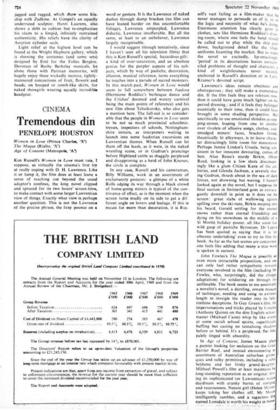CINEMA
Tremendous din
PENELOPE HOUSTON
Women in Love (Prince Charles, 'X') The Magus (Rialto, 'X') Age of Consent (Metropole, Ken Russell's Women in Love must rate, I suppose, as virtually the cinema's first try at really coping with D. H. Lawrence. Like it or lump it, the film does at least leave a sense of reaching out beyond the usual adaptor's confines, the long novel clipped and spruced for its two hours' screen-time, to make contact with some larger Lawrentian view of things. Exactly what view is perhaps another question. This is not the Lawrence of the precise phrase, the foxy pounce on a
word or gesture. It is the Lawrence of naked dashes through damp bracken (no film can have leaned harder on this uncomfortable foliage), Lawrence empurpled, Lawrence didactic, Lawrence insufferable. But all the same, at least to an unbeliever, Lawrence largely recognisable.
I would suggest (though tentatively, since I haven't seen all his television films) that this is Ken Russell's special, hazardous gift: a kind of over-saturation, and an absolute genius for the purpler aspects of his sub- jects, which by way of pastiche, decoration, allusion, musical reference, turns everything he touches into a parade of sacred monsters. In this march-past, Women in Love would seem to fall somewhere between Isadore (Hermione Roddice's burlesque dance and the Criches' doomed and watery carnival being the main points of reference) and his new film about Tchaikovsky, who also gets a mention here. The fall-out is so consider- able that the people in Women in Love seem to be not so much provincial schoolmis- tresses, inspectors of schools, Nottingham- shire miners, as interpreters waiting to launch into some Isadorian excursions on Lawrentian themes. When Russell can let them off the leash, as it were, in the naked wrestling scene, or in Gudrun's prancings before Highland cattle as shaggily perplexed and disapproving as a herd of John Knoxes, the circle is complete.
In any case, Russell and his cameraman, Billy Williams, work in an assortment of exclamatory gestures: a glimpse of a white Rolls edging its way through a black crowd of home-going miners is typical of the con- trivance of effect, as is the moment when the screen turns madly on its side to get a dif- ferent angle on lovers and leafage. If this is meant for more than decoration, it is R us-
sell's vast failing as a film-maker that he never manages to persuade us of it, or of the logic and necessity of what he's doing. Enormous attention has clearly gone to clothes, sets like Hermione Roddice's draw
ing-room, where one feels the band should be called out to play while the ship goes down, background detail like the khaki uniforms haunting the market. But to make the novel so excitedly, lip-smackingl) 'period' in its decorations leaves unrecon- ciled problems of thought and character, a kind of weightlessness never securely anchored in Russell's direction or in Larry Kramer's devoted script.
- Lawrence's ideas remain obstinate and obstreperous ; they still make a tremendous din. If the film feels they are relevant now, then it could have gone much lighter on the period dressing ; and if it feels they belonged essentially to their time, then it could have brought in some shading perspective. But uncritically to use emotional shindies as step. ping-stones, leaping from one to another over rivulets of allusive songs, clothes, coal- smudged miners' faces, bracken fronds, theatrically lit alleyways, is to leave charac- ter distractingly little room for manoeuvre. Perhaps Jennie Linden's Ursula, being con sistent in her innocent devouring, comes off best. Alan Bates's sturdy Birkin, Oliver Reed, looking in a few shots disconcert- ingly like a glum Citizen Kane of the col- lieries, and Glenda Jackson, a severely shin- ing Gudrun, thrash about in the sea of dark forces, not drowning but waving. I haven't looked again at the novel, but I suppose the final section in Switzerland goes as extrava gantly downhill in print as it does on the screen: great slabs of wallowing egoism spilling over the. ski-runs, Birkin moping into his beard, Gerald settling for the eternal snows rather than eternal friendship and dying on his snowshoes in the middle of a St Moritz holiday poster, all like some last wild gasp of pastiche Byronism. Dr Leavis has been quoted as saying that it is an obscene undertaking' even to try to film the book. As far as the last scenes are concerned. one feels like adding that many a true word is spoken in earnest.
John Fowles's The Magus is possibly an even more intractable proposition, and one can only feel rather sympathetic towards everyone involved in the film (including Mr Fowles, who, surprisingly, did the choppy adaptation) for soldiering on through the unfilmable. The book seems to me essentially a novelist's novel, a dazzling, ornate masque of technique, needing and using its extreme length to inveigle the reader into its laby- rinthine deceptions. In Guy Green's film, the impersonations and tricks played by Conchs (Anthony Quinn) on the dim English school- master (Michael Caine) whip by like events at some occult school sports, superficially baffling but casting no tantalising shadows before or behind. It's a perplexed, flat film. palely tinged with absurdity.
In Age of Consent, James Mason 00 a painter looking for seclusion on the Great Barrier Reef, and instead encountering an assortment of Australian suburban grotes ques and sulky primitives, including a rabid beldame and her frisky grand-daughter. Mithael Powell's film at least maintains hs long-standing reputation as an original. mit ing its sophisticated (or Lawrentian) nature daydream with cranky bursts of romping and raucousness. Nature girl (Helen Wren) keeps taking her clothes off, Mr Masco intelligently rambles, and a sagacious dot named Lonsdale is worth his weight in bon e%






































 Previous page
Previous page